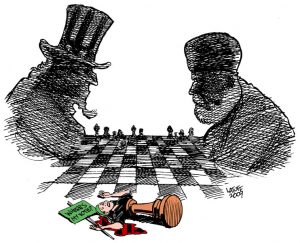When war erupts, it appears sudden. Yet, with a little digging, it reveals itself as a longitudinal event waiting for the perfect flashpoint moment to erupt. This conflict between Iran and Israel was inevitable, a logical occurrence when two powers in a region vie for supremacy.
Iran and Israel were allies
A surprise to many is that Iran and Israel were once regional allies. After Israel was founded in 1948, Iran was one of the few Muslim-majority countries to recognize it de facto, though not officially.
Under the Shah of Iran, Mohammad Reza Pahlavi, both nations had strong military, intelligence, and economic ties. Iran supplied Israel with oil, while Israel’s intelligence agency, Mossad, assisted Iran’s counterpart, SAVAK.
Both countries even cooperated against mutual Arab rivals. Israel armed Iran in their war with neighboring Iraq, done discreetly through backdoor deals. Their relationship was co-operative and mutually beneficial.
However, the hands of time have a way of altering things.
The Shah flees, the new regime cuts all ties with ISRAEL
In 1979, the Islamic Revolution in Iran overthrew the Shah, paving the way for Ayatollah Khomeini to take power. The new Islamic Republic of Iran adopted a hardline anti-Israel ideology.
Shortly afterward, Iran cut all ties with Israel and began supporting groups like Hezbollah in Lebanon and Hamas in Gaza.
The rivals have been in a proxy war ever since, where two opposing countries support combatants that serve their interests instead of waging war directly.
2000s – Present: Heightened Tensions
Iran’s nuclear program, missile development, and support for anti-Israel militias have made it a major threat in the eyes of Israeli policymakers.
Conversely, Israel has reportedly carried out cyberattacks, assassinations, and airstrikes targeting Iranian interests in Syria and beyond. For the better part of fifty years, their relationship has been icy at best.

To properly gauge why war occurs, take out a map.
The two nations continue to jockey for dominance in the region, a phenomenon that’s unlikely to change. Why? Prime real estate with a plentiful supply of resources, most notably oil. Control the pipelines, and you control the world.
War is Big Business
When war occurs, there is money to be made; a King’s Ransom of it.
The Military-industrial complex is a cash cow, with companies manufacturing weapons, equipment, logistics, and services from prolonged conflicts. Wars are fought over oil, minerals, strategic land, and other resources. Defense contracts and arms sales are natural byproducts.

Compromised talking heads will parrot on about it being a battle between good and evil. This is the stuff of Hollywood fable. Rest assured, war always comes down to money and who makes it.
A Blurprint: 7 Countries in five years
Some years back, retired Gen. Wesley Clark claimed he saw a Pentagon memo shortly after 9/11.
“We’re going to take out seven countries in five years, starting with Iraq, and then Syria, Lebanon, Libya, Somalia, Sudan, and finishing off, Iran.”
This wasn’t some grifter brought in from nowhere. Clark was the former NATO Supreme Allied Commander of Europe and even ran for President in 2004.
He said the memo reflected neoconservative foreign policy ambitions inside the Bush administration. Furthermore, he cited people like Paul Wolfowitz and Donald Rumsfeld as proponents of a strategy to reshape the Middle East by force.
Critics of U.S. foreign policy have cited Clark’s account as evidence of premeditated regime change agendas. The authenticity of the memo is a topic of discussion, with many claiming it was a speculative draft rather than official policy.
Nonetheless, the countries mentioned certainly seem like dominoes that were cast in full succession.
Iran vs Israel fallout
Some individuals theorize that the unrest in the Middle East is by design, a camouflage masking the pending collapse of the U.S. dollar.
Whether this is true is speculative at best. However, the tumultuous state of the world is tough to refute. A quarter of the way through the 21st century, with multiple wars and a generational pandemic from parts unknown. China, here’s looking at you, kid.
The fall of a geopolitical powerhouse is much like the Iranian-Israeli conflict; it starts on the micro-level. One has to pay close attention to see it. Perhaps the events unfolding in real-time are warning signs of the American Empire in decline.
https://www.bitchute.com/video/B3LiiskjgoRv
My advice: ask the following when needle-moving events transfix the world: Who benefits?
Do that, and you’ll find out sooner than later what was really in play.
Sign up for K-Var’s weekly newsletter and discounts here.

Leave a Reply